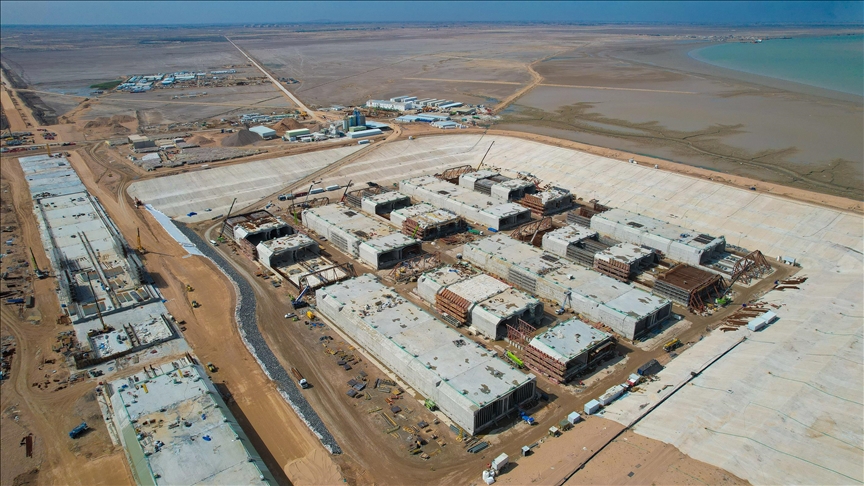Turkish president's Iraq visit to boost momentum for Development Road project
New project aims to connect Persian Gulf to Europe via Türkiye
 The construction of the largest immersed tunnel, which will provide the sea-land connection of the Development Road Project, continues in Basra, Iraq on February 17, 2024.
The construction of the largest immersed tunnel, which will provide the sea-land connection of the Development Road Project, continues in Basra, Iraq on February 17, 2024.
ANKARA
The Turkish president's ongoing visit to Iraq is expected to boost the Development Road project that would connect the Persian Gulf to Europe via Türkiye, amid close collaboration between Ankara and Baghdad.
The project is a critical agenda item during President Recep Tayyip Erdogan's visit to Baghdad and Erbil on Monday. It is Erdogan’s first visit to Iraq in 13 years.
The relations between Türkiye and Iraq are solidifying with recent high-level visits. The construction of the Grand Faw Port in Basra, southern Iraq, aiming to be the largest port in the Middle East and scheduled for completion in 2025, is underway at full speed.
The port, which is part of the first phase of the Development Road project, is located at the mouth of the Shatt al-Arab, where the Tigris and Euphrates rivers converge before flowing into the sea.
The project encompasses railway and highway lines extending from the port through the cities of Diwaniyah, Najaf, Karbala, Baghdad, and Mosul to the Turkish border, aiming to provide access from the Turkish border to Mersin Port and onward to Europe via Istanbul by road.
Italian company PEG Infrastructure is responsible for the design of the route traversed by the project, which will enter Türkiye via Ovakoy after Mosul.
Connecting the Grand Faw Port to the Turkish border with a 1200-kilometer (746-mile) railway and highways, the project will open a new gateway for regional trade.
Through the project, Iraq and Türkiye aim to reduce travel time between Asia and Europe and become transit hubs. Expecting to surpass the 67-berth Jebel Ali Port in Dubai, known as the largest container port in the Middle East, the Grand Faw Port with its capacity of 90 berths is planned to be completed by 2025.

The Development Road project, reaching from the port to the Turkish border, is seen as an alternative option in possible regional conflicts or wars since China's Silk Road does not pass directly through Iraq.
Upon completion of the project, it is estimated that shipments that currently take approximately 45 days from the Cape of Good Hope and around 35 days from the Red Sea could be completed in just 25 days.
Incorporating highways, railways, energy transmission, and communication lines and planned to be completed in three stages set for 2028, 2033, and 2050, the project will influence a vast region from Europe to the Gulf countries.
While the trade volume between Türkiye and Iraq has exceeded $24 billion, the potential business opportunities offered by the project are promising, and upon its completion, all stakeholders are expected to reap significant economic benefits.
Initially dubbed the Dry Canal, the project's name was changed to Development Road during a meeting between Erdogan and Iraqi Prime Minister Mohammed Shia Al Sudani in Ankara in March 2023, and it is regarded as the foundation of a sustainable non-oil economy in Iraq.
Collaboration
Speaking at the Development Road project held in Baghdad on May 27, 2023, with the participation of neighboring countries and representatives from the Gulf region, Al-Sudani said that the project will change the reality in terms of establishing a strong economy with employment, financial leverage and an increase in the value of gross national product.
Since then, there has been intense contact between Ankara and Baghdad at every level regarding the project, with Turkish Foreign Minister Hakan Fidan playing a crucial role.
In October 2023, representatives of railway administrations from Türkiye, Iraq, the UAE, and Qatar met in Ankara.
Furthermore, on Jan. 17-18, representatives from the Iraqi Republic Railways and the consulting firm PEG engineers held a meeting with Turkish officials in Ankara. During the discussions, an agreement was reached on the location of the road and railway border crossing point at Ovakoy-Fishabur.
The project, aimed at being the "new Silk Road," has a massive cost of $17 billion and Türkiye, together with Gulf countries and China, is expected to contribute to the financing and completion of the project.
"The main actors of the (Development Road project) are Türkiye, the UAE, and Iraq. This road will become a new Silk Road for our region and will also serve regional peace," Erdogan said during his visit to the UAE in February.
In addition to the ongoing efforts, the Turkish and Iraqi governments will invest $23.8 billion in the Development Road project. Türkiye will allocate these investments for railways and highways.
According to information compiled by Anadolu, the Turkish Transportation and Infrastructure Ministry has planned 615 kilometers (382 miles) of new railway lines for the 2,088 kilometers of railway connections passing through the country, and 320 kilometers of new highway for the 1,912 kilometers of the highway corridor.
While 439 kilometers of the railway network are currently in place, some 1,034 kilometers are being constructed, another and 615 kilometers are planned. The planned railway networks are located between Gaziantep and Ovakoy. An investment of $5.8 billion is projected for this railway.
As part of the project, the highway passing through the country will be 1,912 kilometers. While 1,592 kilometers of these highways already exist, 320 kilometers have been planned. The investment amount of the highway planned between Sanliurfa and Ovakoy is estimated to be $2 billion.
Anadolu Agency website contains only a portion of the news stories offered to subscribers in the AA News Broadcasting System (HAS), and in summarized form. Please contact us for subscription options.







